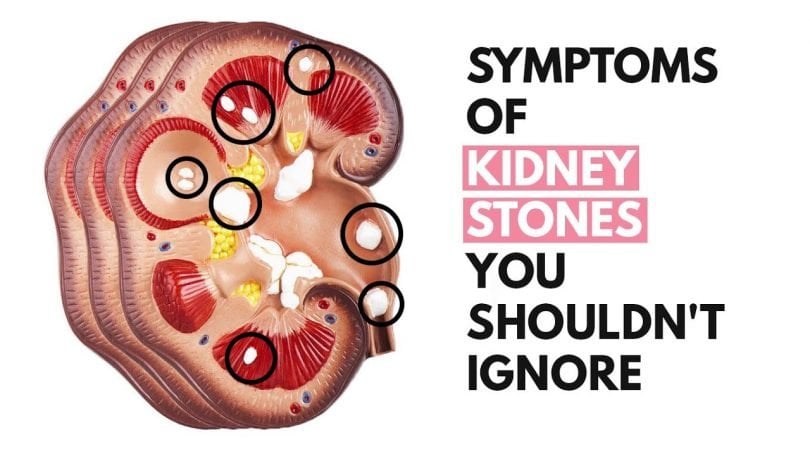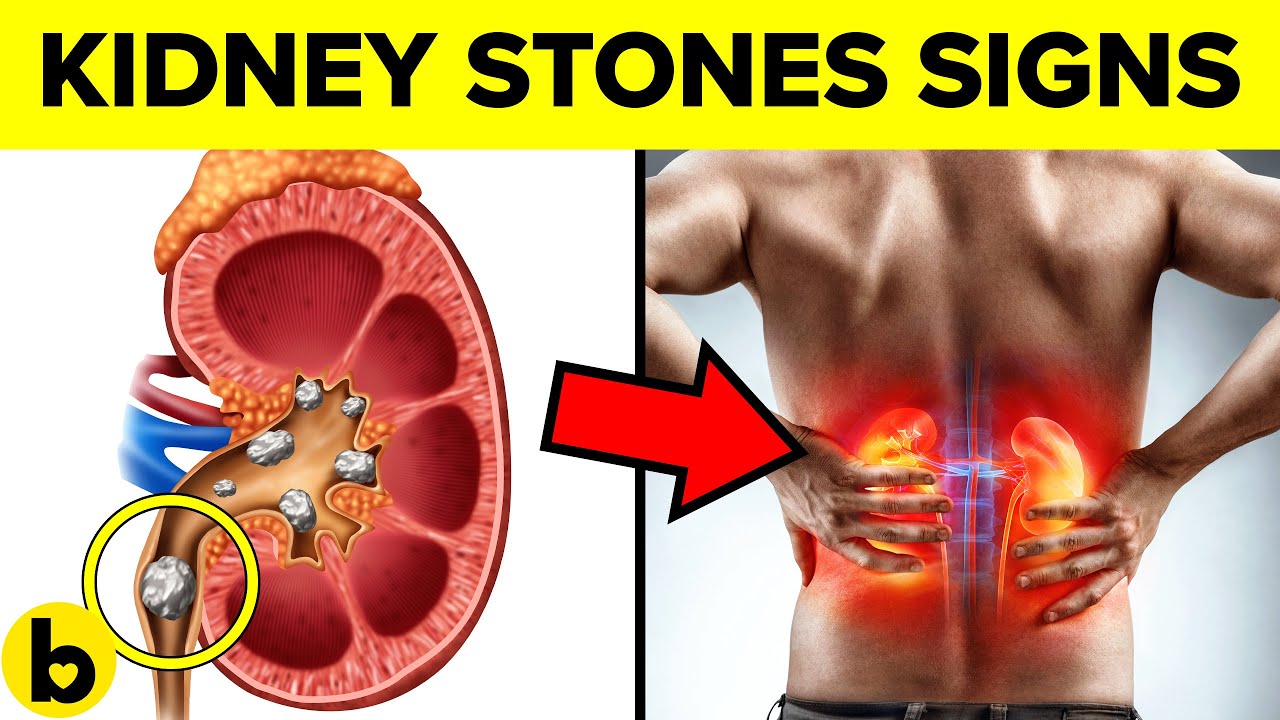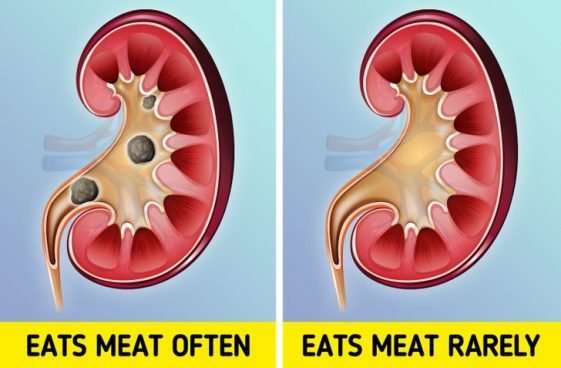How Are Ureteral Stones Diagnosed
Kidney or ureteral stones are diagnosed by your doctor. He or she may:
- Give you a physical exam and ask about your medical history.
- Test your urine to see if it contains substances that form stones.
- Test your blood to see if you have health problems that may have led to stones.
- Order an imaging test to find the location of the stones. Imaging tests may also help to see if you have health problems that may have led to stones. Ultrasound is an effective imaging test to look for blockage. A computed tomography scan will help guide therapy by informing the doctor of the size, location, and hardness of the stone.
What Would Happen If Kidney Stones Are Left Untreated
In situations where there is a kidney stone which is large enough that it cannot pass through the urine can block the urinary tract which may cause obstruction of urine. This obstruction further causes pain. If the individual leaves the kidney stone condition as is and does not get it treated, the pain might go away after some time and the individual may think that the problem has been dealt with however, in actuality the exact opposite happens and the blocked kidney stops functioning.
If the condition of kidney stone is left untreated then it may lead to complete shut down of the kidney resulting in renal failure which will then have severe repercussions for the affected individual. In some cases, the stone may even cause the kidney to get ruptured which is even more challenging to treat.
In conclusion, it is extremely important to treat a kidney stone as soon as it is diagnosed. If the kidney stone is small, the physician may give some pain killers and advice to drink more water to allow the stone to pass through the kidneys. However, if the stone is big then laser treatments may be required to treat this condition. If left untreated, kidney stones may lead to complete shut down of the kidney causing permanent damage and even complete failure of the kidney to function which can be catastrophic for the individual.
What Treatments Are Available
Because of the pain caused by kidney stones, many people find that they need pain relief. Many describe it as the worst pain theyve ever felt.
If you have a kidney stone, you will be encouraged to drink a lot of water if you dont have a medical condition that limits the amount you may have. The extra fluid is to help wash the stone through your urinary system.
If the stone doesnt pass within a reasonable amount of time, your doctor may recommend extracorporeal shock wave lithotripsy . Shock waves are sent through to the stone to break them down into smaller pieces that can be passed. Sometimes, surgery may be needed.
The stone should be removed because of the high risk of infection, which could in turn lead to sepsis.
Don’t Miss: How To Know If You Have Bad Kidneys
Treatment For Kidney Stones
Most kidney stones can be treated without surgery. Ninety per cent of stones pass by themselves within three to six weeks. In this situation, the only treatment required is pain relief. However, pain can be so severe that hospital admission and very strong pain-relieving medication may be needed. Always seek immediate medical attention if you are suffering strong pain.
Small stones in the kidney do not usually cause problems, so there is often no need to remove them. A doctor specialising in the treatment of kidney stones is the best person to advise you on treatment.
If a stone doesnt pass and blocks urine flow or causes bleeding or an infection, then it may need to be removed. New surgical techniques have reduced hospital stay time to as little as 48 hours. Treatments include:
Things That Can Help You Take A Pass On Kidney Stones

- By Matthew Solan, Executive Editor, Harvard Men’s Health Watch
If youve ever passed a kidney stone, you probably would not wish it on your worst enemy, and youll do anything to avoid it again. “Kidney stones are more common in men than in women, and in about half of people who have had one, kidney stones strike again within 10 to 15 years without preventive measures,” says Dr. Brian Eisner, co-director of the Kidney Stone Program at Harvard-affiliated Massachusetts General Hospital.
Don’t Miss: Pomegranate Kidney Stones
Some Of The Major Risk Factors For Kidney Stones Are:
- Family or personal history of the condition
- Obesity
- Inflammatory bowel diseases
- Some specific medications
One of the major factors that increase the risks of kidney stonesis the production of less than 1-liter urine per day. This is probably the reason why premature babies with kidney problems are more prone to developing kidney stones.
Kidney stones do not have any symptoms until they move around in the kidney. These are also sometimes called silent stones. However, once they start moving around in the kidney and pass into the ureter, symptoms may start surfacing. At this stage, you may experience severe and excruciating pain in the lower back. Men may experience pain in the groin area as well. Other symptoms of kidney stones include brown or red-colored urine, blood in the urine, urinating small amounts of urine and pain while urinating.
Also, kidney stones can worsen over time. If left untreated, kidney stones can lead to a number of complications.
How Are Kidney Stones Diagnosed
Your healthcare provider will discuss your medical history and possibly order some tests. These tests include:
- Imaging tests: An X-ray, CT scan and ultrasound will help your healthcare provider see the size, shape, location and number of your kidney stones. These tests help your provider decide what treatment you need.
- Blood test: A blood test will reveal how well your kidneys are functioning, check for infection and look for biochemical problems that may lead to kidney stones.
- Urine test: This test also looks for signs of infection and examines the levels of the substances that form kidney stones.
Recommended Reading: How Much Is Kidney Worth
How Can I Learn What I Should Eat
All dialysis and transplant centers have a dietitian who can help you plan your meals. A renal dietitian has special training in counseling people with kidney failure.
Nutrition counseling from a registered dietitian to help meet your medical or health goals is called medical nutrition therapy . Medicare pays for MNT for people with kidney disease with a written referral from your doctor. If you have insurance other than Medicare, ask if it covers MNT for kidney failure. You will also need a referral from your health care provider to a dietitian for MNT services.
You can find a registered dietitian online through the Academy of Nutrition and Dietetics or through your health care provider. Work closely with your dietitian to develop a meal plan that includes foods and drinks you enjoy eating while maintaining your health.
How To Prevent Kidney Stones
There are various kidney stone treatment options available, but about half of people who have a kidney stone develop another one at a later time in their lives. Drinking plenty of water each day may help in preventing kidney stones in future.
For the few people who have a high level of certain chemicals in the body, further advice and treatment to reduce the amount of these chemicals may be needed.
Recommended Reading: Can Kidney Stones Cause Constipation And Bloating
Does Masturbation Have A Bad Effect On Kidney
There are many myths about masturbation circulating these days. Thanks to the all-mighty internet, while some of these are circumlocutory, others were found to be misleading. A lot of people are raising doubt about the effect of masturabtion on kidneys. Some say masturbation has a devastating effect on kidneys, while others deny the judgment. Lets then quickly know the facts and burst the myth ballon
There is a pair of kidneys located on both sides of your spine. The kidneys main function is to purify the blood and pass the waste through a tube-like structure called the urethra. When in intercourse or masturbation, the base of the bladder closes, cutting off the connection. This ensures no urine flow or any interference. Thus not affect the kidney. It keeps functioning in a usual manner.
Dietary Calcium And Kidney Stones
Only lower your calcium intake below that of a normal diet if instructed by your doctor. Decreased calcium intake is only necessary in some cases where absorption of calcium from the bowel is high.
A low-calcium diet has not been shown to be useful in preventing the recurrence of kidney stones and may worsen the problem of weak bones. People with calcium-containing stones may be at greater risk of developing weak bones and osteoporosis. Discuss this risk with your doctor.
Recommended Reading: Cranberry Juice And Liver
Will Kidney Failure Affect My Sleep
People who have kidney failure may have trouble sleeping. Sleep loss can affect your quality of life, energy level, and mood. Restless leg syndrome, sleep apnea, pain, or itching may make it hard for you to sleep.
You can take a number of steps to improve your sleep habits. For example, physical activity during the day and a warm bath before bed may help you sleep better at night. Avoid caffeine after lunchtime. Avoid alcoholic drinks before bed. Avoid smoking.
Talk with your health care provider if you often feel sleepy during the day or have trouble sleeping at night. Health care providers can treat sleep disorders such as sleep apnea or restless leg syndrome.
Take Steps To Bypass Kidney Stones

Even though kidney stones can be common and recur once youve had them, there are simple ways to help prevent them. Here are some strategies that can help:
1. Drink enough water. A 2015 meta-analysis from the National Kidney Foundation found that people who produced 2 to 2.5 liters of urine daily were 50% less likely to develop kidney stones than those who produced less. It takes about 8 to 10 8-ounce glasses of water daily to produce that amount.
2. Skip high-oxalate foods. Such foods, which include spinach, beets, and almonds, obviously raise oxalate levels in the body. However, moderate amounts of low-oxalate foods, such as chocolate and berries, are okay.
3. Enjoy some lemons. Citrate, a salt in citric acid, binds to calcium and helps block stone formation. “Studies have shown that drinking ½ cup of lemon juice concentrate diluted in water each day, or the juice of two lemons, can increase urine citrate and likely reduce kidney stone risk,” says Dr. Eisner.
4. Watch the sodium. A high-sodium diet can trigger kidney stones because it increases the amount of calcium in your urine. Federal guidelines suggest limiting total daily sodium intake to 2,300 milligrams . If sodium has contributed to kidney stones in the past, try to reduce your daily sodium to 1,500 mg.
Also Check: Is Ginger Tea Good For Kidneys
What Causes Kidney Stones
Kidney stones are formed from substances in your urine. The substances that combine into stones normally pass through your urinary system. When they dont, its because there isnt enough urine volume, causing the substances to become highly concentrated and to crystalize. This is typically a result of not drinking enough water. The stone-forming substances are:
- Calcium.
- Cloudy, foul-smelling urine, fever, chills or weakness which might be a sign of a serious infection.
- Blood in the urine.
Most pediatric kidney stones remain in the kidney, but up to a third may migrate from the kidney and get stuck in a ureter. Stones that remain in the kidney, although often painless, can be the source of recurrent urinary tract infections. Those that lodge in the ureter can create severe colicky pain.
What Are The Causes And Risk Factors Of Kidney Stones
Anyone can get a kidney stone, but some people are more likely than others to have them. Men get kidney stones more often than women do. Kidney stones are also more common in non-Hispanic white people than in people of other ethnicities. You may also be more likely to have kidney stones if:
- You have had kidney stones before.
- Someone in your family has had kidney stones.
- You dont drink enough water.
- You follow a diet high in protein, sodium and/or sugar.
Also Check: Is Mio Bad For Your Kidneys
How Having One Kidney Affects A Kidney Stone
The same things that cause a person with two kidneys to get stones can put a patient with just one at risk. For example, failing to drink enough water is a risk factor, as is obesity or a high protein diet.
When you have just one kidney, you do have to be careful not to damage it, though. If you have symptoms of a stone, see your doctor right away for a proper diagnosis. A person with kidney stones can develop chronic kidney disease that will affect the health of your remaining organ.
The doctor may want to take steps to help you pass the stone, such as using a noninvasive treatment to break it up. Having one stone increases your risk of more forming, too. You may need to change your diet or take medication to manage the condition.
The most important thing is not to ignore any sign that there is a problem with your kidney, whether it is a stone or not. People with one working kidney need a function check at least once a year.
If you think you could be at risk for kidney stones, please contact Georgia Urology today to schedule an appointment and learn more about your treatment options.
What If Kidney Stones Are Left Untreated
The main function of the kidneys is the removal of wastes and excess fluids from the body in the form of urine. Sometimes, when there are too much waste material and not enough fluids, these waste products can crystallize and get collected inside the kidneys. Over time, these crystals can transform into hard stone-like lumps, known as kidney stones.
Kidney stones are very common. It is estimated that 1 in every 20 people around the world develops kidney stones at some point in time in their life. Although people of any age can have kidney stones, kidney stones are more common in the age group of 30-60 years.
You May Like: Can Chocolate Cause Kidney Stones
Where Do Kidney Stones Come From
Kidney stones form develop when certain substances, such as calcium, oxalate, and uric acid, become concentrated enough to form crystals in your kidneys. The crystals grow larger into “stones.” About 80% to 85% of kidney stones are made of calcium. The rest are uric acid stones, which form in people with low urine pH levels.
After stones form in the kidneys, they can dislodge and pass down the ureter, blocking the flow of urine. The result is periods of severe pain, including flank pain , sometimes with blood in the urine, nausea, and vomiting. As the stones pass down the ureter toward the bladder, they may cause frequent urination, bladder pressure, or pain in the groin.
“If you experience any of these symptoms, see your primary care physician,” says Dr. Eisner. “He or she will likely perform a urinalysis and a renal ultrasound, abdominal x-ray, or CT scan to confirm kidney stones are the source of your pain and determine their size and number.”
Symptoms Of Kidney Disease
In the early stages of kidney disease, people can have no symptoms. In fact, some people have no symptoms until over 90 per cent of their kidney function has gone. This is unfortunate because early detection of kidney disease and treatment is the key to preventing kidney failure.
Symptoms of kidney disease can include:
- tiredness
- bad breath an
- a metallic taste in the mouth.
These symptoms can be caused by other conditions, but if you are in a high-risk group for kidney disease, speak with your doctor.
Don’t Miss: Ginger Good For Kidneys
Do Carbonated Drinks Speed Up Passing Kidney Stone
A lot of information is present on the internet about the carbonated drinks/coke treatment of Kidney stones. They claim that phosphoric acid, an additive used in carbonated drinks when consumed in excess quantities can facilitate a reaction within the kidney that will dissolve the calcium oxalate or calcium phosphate i.e., the kidney stone.
Phosphoric acid, mixed with nitric acid, used as a cleaner in the beer industry to remove beer stone from beer kegs. This leads to the false impression that drinking phosphates in beverages will facilitate conditions in the kidney as in the beer kegs.
However, when the small quantities of phosphate found in beverages are ingested, they tend to bind with calcium and magnesium in the gastrointestinal tract. This leads to buffering in the blood and bone, so essentially neutral-not acid-phosphate will be delivered to the site of the stone. Thus, carbonated drinks dont facilitate the passage of kidney stone.
How Can I Prevent Kidney Stones

There are several ways to decrease your risk of kidney stones, including:
- Drink water. Drink at least six to eight 8-ounce glasses every day . Staying hydrated helps you urinate more often, which helps flush away the buildup of the substances that cause kidney stones. If you sweat a lot, be sure to drink even more.
- Limit salt. Eat less sodium. You may want to connect with a dietician for help with planning what foods you eat.
- Lose weight. If youre overweight, try to lose some pounds. Talk to your healthcare provider about an ideal weight.
- Take prescriptions. Your healthcare provider may prescribe some medications that help prevent kidney stones. The type of medication may depend on the type of stones you get.
You May Like: Seltzer Water Kidney Stones